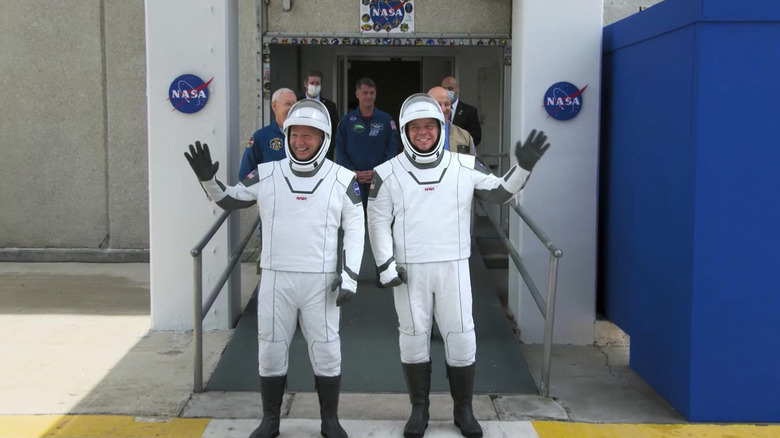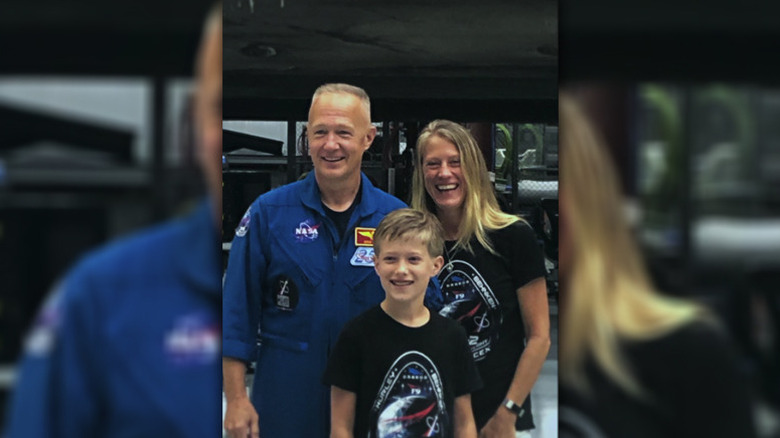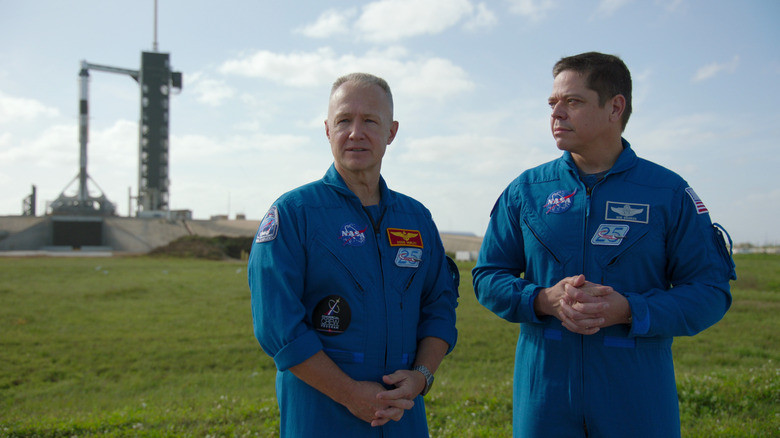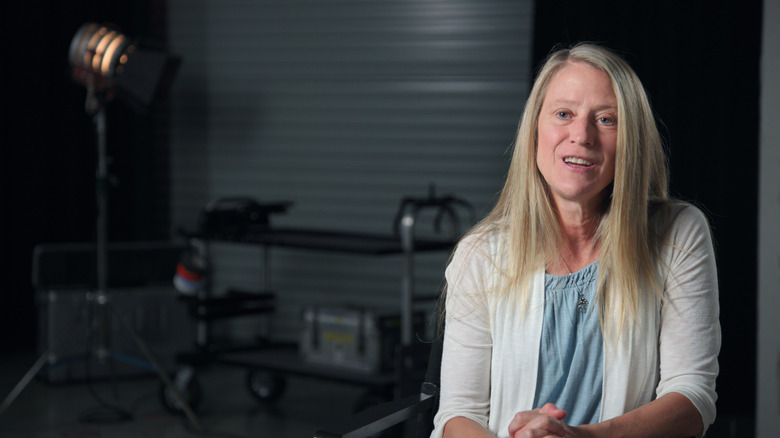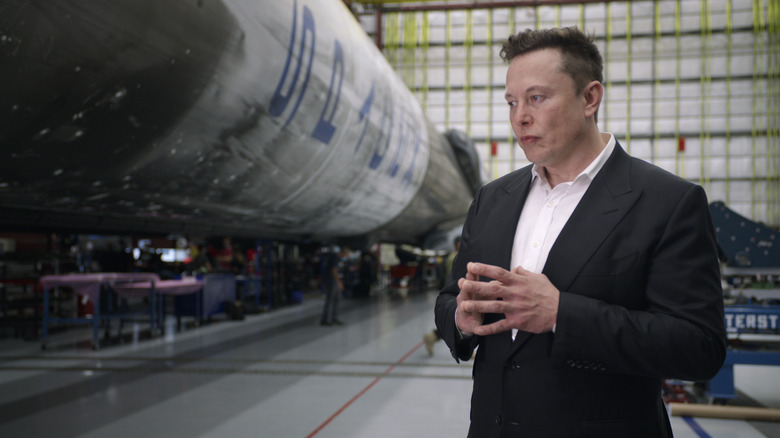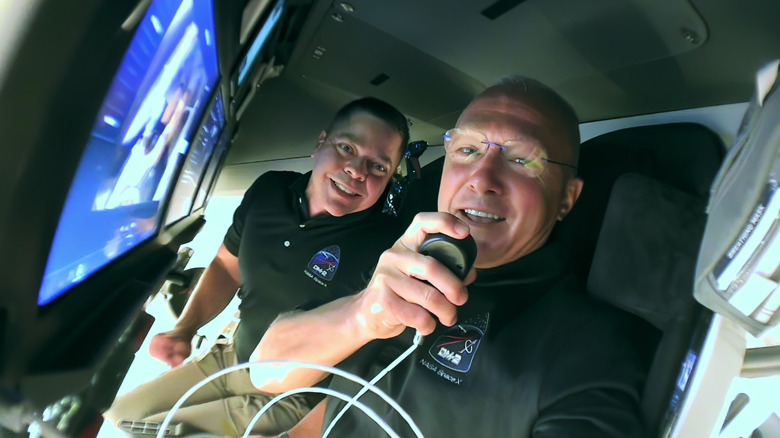Astronauts Discuss Netflix's Return To Space Doc, Inspiring The Next Generation, And More [Interview]
On July 8, 2011, Doug Hurley served among a crew of four astronauts to make the last-ever launch on the space shuttle. Once Atlantis serenely glided its way back to Earth 12 days later, NASA's incredibly popular (but also exorbitantly expensive) shuttle program came to an end after 30 years. Of course, the retirement of the fleet of shuttle orbiters meant that the historically self-sufficient space administration no longer had a way to bring astronauts to space, particularly to the International Space Station. Thus began a fraught decade of the United States relying on Russian rockets for space travel — pricey seats that came in at upwards of $80 million a pop. Obviously, this simply wasn't sustainable for a number of reasons (remember, this partnership took place before Russia's recent invasion of Ukraine, complicating matters even more) ... and that's where Elon Musk and his privately-owned SpaceX company came in.
Netflix's "Return to Space," from co-directors Jimmy Chin and Elizabeth Chai Vasarhelyi ("Free Solo," "The Rescue"), is ostensibly a documentary primarily about the role that SpaceX and its rocket technology played in partnering with NASA and eventually helping them regain a sense of autonomy, allowing the administration to get back to doing what it's always done: Launch astronauts into the stars from American soil, assist them in performing incredible acts of science and exploration, and bring them back to the ground safely. My main takeaway, however, had far more to do with the feats accomplished by astronauts Doug Hurley and Bob Behnken, the first two astronauts ever to reach orbit through a commercial spaceflight upon launch in May of 2020, than the whims of the mega-billionaire embarking on arguably the biggest ego-trip in history.
Luckily, I was able to talk all about it with Doug Hurley and fellow astronaut Karen Nyberg (who also happens to be his wife), both of whom are featured throughout the documentary alongside many others. Throughout the course of our conversation, we covered topics such as their favorite space movies and trying not to focus on realism so much, what they hope this documentary accomplishes, Doug's experience during the 2020 launch to the ISS, and their refreshingly honest thoughts on actors like Tom Cruise planning to film an actual movie (or parts of it, at least) in the vacuum of space.
'['Gravity'] was the first movie I saw that actually started to capture the vivid beauty of the planet'
What's more nerve-wracking: Actually flying to space, or talking about flying to space in interviews?
Nyberg: Probably the interview part for me [both laugh]. Being in front of people, giving talks, talking about things. Definitely [laughs].
Hurley: Yeah, I would totally agree with that. It's part of our job, but maybe the part that, at least with Karen and I, that maybe it's not our most favorite part of the job.
I'll try to make it as enjoyable as possible, I promise [laughs]. So what movies, if any, inspired both of you to get in involved with space in the first place? "2001: A Space Odyssey," "E.T.," "Star Wars," "Star Trek," any of those? There's no wrong answer here.
Hurley: Yeah, for me it was probably the "Star Wars," "Star Trek" interest growing up, because certainly the first "Star Wars" movie was in the mid-seventies and, of course, "Star Trek" was in reruns at that point when I was kind of aware. So for me, that's it. I think I can answer for Karen. She's not much of a movie aficionado.
Nyberg: Yeah. It didn't stem from a movie.
Hurley: Yeah. It was more just real life and wanting to be an astronaut from a very young age.
So you're familiar with movies like "Apollo 13," "Gravity," "Interstellar"...?
Nyberg: Even I've seen those [laughs].
Hurley: Yeah. I mean, I'm not one of those people that gets real wrapped around the axle about the realism of the movies. What I tell people about "Gravity" is, that was the first movie I saw that actually started to capture the vivid beauty of the planet, looking down. So whatever they did for the CGI for that movie, that was the first one where I remember Karen and I were actually watching it and I'm like, "That kind of looks like what it looks like from space."
Nyberg: That makes up for the bad physics [laughs].
Hurley: The physics of all the space stations and the Hubble being in the same orbit, that's a whole other story. And I don't want to bore people with that part [laughs]. And then, I think the other space movie — certainly "Apollo 13" was awesome. They did a great job with that one. But "The Martian" was one that resonated with me quite a bit. Because, one, we had read the book and they did a great job of following the book for the most part. But just the interaction of the crew at the beginning and, of course, towards the end.
And then frankly, way that Matt Damon's character reacted to that situation. I think that's not atypical of most of the people in our profession at NASA. We have a few that could out-MacGyver even Matt Damon's character, but we have a couple others that [laughs] maybe they wouldn't have made it that whole four years. But for the most part, I think it really did do a great job of capturing that interaction between the ground and the crews, and the crews themselves, and just the different personal dynamics, I thought.
I don't know if you've heard of a movie released earlier this year called "Moonfall." I highly recommend it, if you haven't. The premise is that the moon is falling out of orbit and about to collide with Earth. Very realistic stuff. It's ... interesting [laughs].
Hurley: [unconvinced] Yeah, I've heard of it, we haven't seen it yet.
'For me it is all about inspiring that next generation and that young kid'
So in all seriousness, Doug, Karen, I'm sure you both watched the Netflix documentary by now. Did it adequately capture, as much as it could, the experience of what it was like being up there that whole time?
Hurley: I think they did a great job. As I was saying in a previous interview, we saw a rough cut of the film, so we haven't seen the final version, but I do think they really did do a wonderful job of capturing the behind-the-scenes and talking to a number of people that you wouldn't necessarily have gotten to know otherwise, that were hugely, hugely pivotal and important to the success of our flight. And then, yeah, just capturing more of the day-to-day, some of the behind-the-scenes, however you want to put it, of what it took to get us from, say, 2013, 2014, 2015, where the shuttle had stopped flying by then and what everybody had to do and how long it took to get us to that day in May of 2020, where we actually launched.
From both of your interviews and comments during the documentary, it seems clear that you both understand that there's the PR aspect, there's educating the masses, there's even inspiring the next generation of explorers. What do you hope that this documentary accomplishes?
Hurley: Well, I think, for me it is all about inspiring that next generation and that young kid, like we were, I hate to say it, many, many years ago [laughs] that was fascinated with not only exploration, but service to the country. I just think it gives you a lesson on, you can't have overnight success. This takes a huge amount of sacrifice to do something bigger than yourself, to do something that benefits humanity. I think the movie captures that.
It also captures a little bit about what we went through as the world. We were just getting to the point where it's like, "Okay, I can see the light at the end of the tunnel. I think we're going to fly this year. I think we're going to fly soon." And then, literally, in March of 2020, the whole world changes with the pandemic. And we were, actually, it was the week of spring break for Texas, so Karen and [their son] Jack had come out to SpaceX. We had training that week and by the end of that week, the whole world was shut down. It just added such a layer of things ... we had been waiting almost nine years to return the United States to low Earth orbit. And then to have that thrown at us at literally the last minute was pretty tough to take. But once again, the team came together and two months later, we launched.
'All of us as astronauts ... are surprised that it's taken us this long'
Karen, do you think this documentary will help someone like your son, Jack, understand what his parents do, through this kind of experience?
Nyberg: I think so. And I think he is getting there. He was really young when we flew before. [Doug's] first shuttle flight, I had just gotten pregnant. For his last shuttle flight, Jack was 18 months old. For my long duration flight, Jack was 3. So he doesn't even remember those. But for this one, he was 10 and I think he really started to get it. Then when we did watch the preview of [the documentary], I think he's getting it. He's still, I don't know if he wants to admit that what we do is cool [laughs], but I think he is starting to get it.
One thing I'm curious to see how viewers react to the documentary is how it offered a brutally honest assessment of NASA being unable to go back to the moon for 50 years. Did you expect the documentary to shy away from that a little more than it did, or was that just the elephant in the room and it had to be addressed?
Hurley: Well, I certainly think all of us as astronauts, and certainly people that kind of gravitate to that interest in the public, are surprised that it's taken us this long. I mean, I think in our careers, obviously, we're retired now as active astronauts, but in our careers we had two or three different potential moon programs started and canceled just in the 20 years that we were astronauts, give or take. So, unfortunately, I think NASA gets a lot of that blame and it's really much more political than that. And it really got into the cycle where if one political party had a program, the next political party, if there was a change, it got canceled or it got completely changed, redirected, whatever the word you want to use.
That is just — you cannot build that infrastructure, you cannot build those vehicles, you cannot develop the technologies that, compared to what we had in the '60s, you certainly owe to the crews and you owe it to the mission to build something better than what we built in the '60s. The political will changed too much and those things happen. And that's part of being a government agency, is the elected officials make those funding decisions, and it's not to say that the people at NASA couldn't do it, the people at private industry couldn't do it, that was absolutely not the case. It's the politics that are involved. Once again, it's not inexpensive to build this infrastructure, to build these vehicles to go to the moon. And it just unfortunately didn't happen for a while.
The good news is we are really close to the first flight of Artemis I. I think when that vehicle launches, it will be one of these, "Finally, we're back on track to do that." And yeah, I feel like NASA should not get that blame. I mean, we worked very hard over the years on the programs that we were awarded and had, and it just got moved, canceled, changed, and we had to adjust as an agency.
'It's extremely important for us to continue doing this'
Now, someone like Elon Musk, he obviously is a bit of a divisive figure. He has a huge following, thanks to kind of a rock-star persona, I guess you could call it. The documentary even mentions that he has an Iron Man suit in SpaceX HQ, things like that –
Hurley: He actually does [laughs]. I went by it every day for a thousand days, I'm sure. Yep. As you go from the first floor to the second floor, it's right there.
So obviously on the other side of that, there's maybe a little bit of skepticism and scorn to come with that. People are asking, "Why go to space when Earth has so many problems of its own?" How do you respond to that? What do you make of that perspective?
Nyberg: For me, I mean, there's one very obvious thing. It's getting to space and looking back at Earth and seeing what Earth is to us. It is a lone being [laughs] in the middle of blackness and it's our spaceship, and we're all crewmates on that spaceship. And it's getting that perspective. That's a huge thing. As we get more and more people to get that perspective, I think that's a wonderful thing.
Also, we can do research in space without the force of gravity and learn things that you cannot learn with that large force of gravity affecting fluids and particles and flames and that sort of thing. And also it's just our inherent need from the beginning of time to expand out and explore and do things.
Then, finally, it's inspiring for kids. We need more people studying the STEM fields and space. NASA is inspiring, and it gets people to study that. It got me to study it. Now, I became an astronaut. If I hadn't, I'd be an engineer. And so it got me to study that and get in those fields. So I think for all those reasons it's extremely important for us to continue doing this.
'It just gets exploration [and] space out there for more people'
A fascinating wrinkle in the last couple years has been, a year ago, Russia sent a film crew up to the International Space Station to actually film a movie. And now Tom Cruise will be doing that a couple years from now, partnering with SpaceX and Elon Musk. As astronauts, what is your perspective on that? Do you think it's a waste of resources? Does the potential for education maybe make it justified? What do you make of that?
Hurley: I think, in the end, it's kind of like Karen said. The more that we can get people exposed to that experience or to actually get to do that experience, the more people you can reach, I think, the better. Ssome of it is certainly very commercial or, I'll be really honest with you, based on that individual's ego and wealth, which to me is unfortunately part of it. But the greater good, the bigger picture is, it just gets exploration [and] space out there for more people...
The ultimate goal is going to Mars. So I think in the bigger picture, I certainly don't like some of the stuff going on in space, but it's expected, right? This is just a natural evolution. So from that standpoint, it's good. And it's very interesting just to see how things have changed just in the two years, I mean, not even two years, since Bob and I launched. I would not have expected things to just explode — poor choice of words probably [laughs] — but it's just amazing to see suborbital flights, orbital flights. We're at the beginning stages of what could be an incredible low Earth orbit environment, in maybe just a few years, if not a decade.
"Return to Space" hits Netflix on April 7, 2022.
